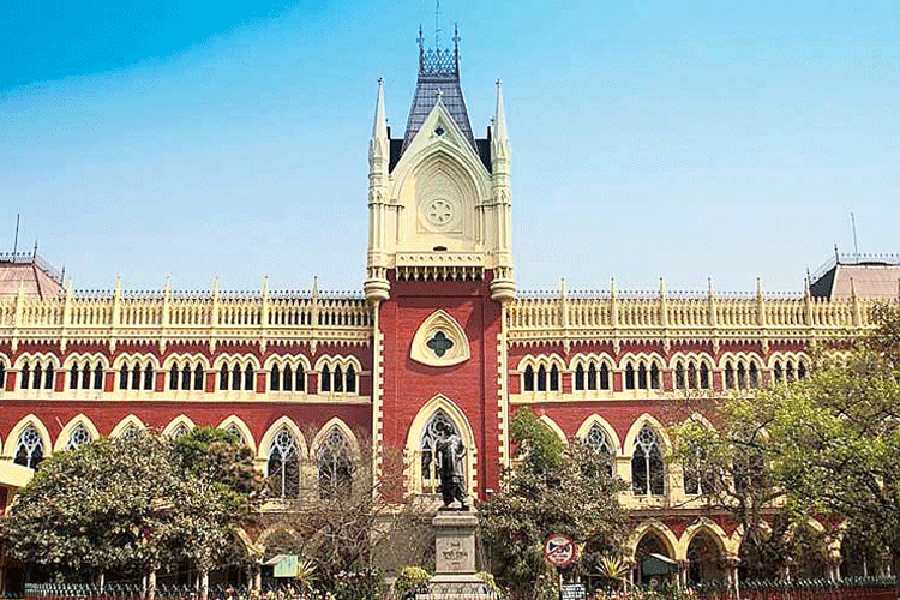Choosing to refrain from imposing a ban on mass sacrifice of animals during festivals, the Calcutta High Court on Friday directed a temple committee in Balurghat to comply by all conditions which the Dakshin Dinajpur district authorities imposed on it over its bid to sacrifice over 10,000 goats in a day.
The direction was passed by the Division Bench of Chief Justice TS Sivagnanam and Justice Hiranmay Bhattacharyya in response to a PIL moved by a social welfare organization against the decision to slaughter huge number of animals on the occasion of Kali Puja organised by the Bolla Kali Mata Puja Committee in the district’s Bolla village on the same day the case was heard.
The petitioners sought for a direction to ensure that the state authorities ensured a stoppage to the animal sacrifice ritual in strict compliance of the Prevention of Cruelty to Animals Act, 1960, Transport of Animal Rules, 1978, Prevention of Cruelty to Animals (Slaughterhouse) Rules, 2000 and West Bengal Animal Slaughter Control Act, 1950.
The Bench, while noting that no interim order could be passed for effective implementation at the last minute since that matter was listed for hearing on a day the ritual was supposed to be conducted, still decided to entertain the petition “considering the larger relief sought for by the petitioners”.
The Bench referred to a Supreme Court decision argued by the petitioners’ counsel and stated in its order: “In the said decision, various directives were given by the Hon’ble Supreme Court, some of which are 1) animals not to be slaughtered except in recognised or licensed houses; 2) no person shall slaughter any animal within a municipal area except in a slaughterhouse recognised or licensed by the authority concerned empowered under the law for the time being in force to do so; 3) no animal, which is pregnant, or has an offspring less than three months old, or is under the age of three months or has not been certified by a veterinary doctor that it is in a fit condition to be slaughtered, shall be slaughtered and; 4) no animal shall be slaughtered in a slaughterhouse in sight of other animals.”
It was the petitioners’ case that the temple authorities stood in violation of the said norms underlined by the Apex court.
“As observed by us earlier, a long-term solution has to be brought about as there is no specific statute in the State of West Bengal banning sacrifice of animals either as a mass sacrifice or for temple festivals,” the court stated in its order.
Taking cognizance of the submission of the state that the district administration have already held meetings with the temple committee and imposed restrictions on the said slaughter ritual, the court directed: “As could be seen from the conditions imposed, which obviously, have been agreed to by the members of the temple committee, they have to abide by the decision of the Hon’ble Supreme Court and this Court setting down guidelines. However, there is a clear bar for mass sacrifice during the puja. It is true that the temple committee has not been impleaded as a party to the writ petition. Nonetheless, the committee members having agreed to the various conditions, which have been imposed by the district administration, are bound to follow the same in its letter and spirit.”
“The Court is conscious of the fact that the festival has already begun and at this juncture no positive direction can be given and even assuming such directions are given, they may become unworkable. However, taking note of the fact that the members of the committee of the concerned temple have unequivocally agreed to the conditions… district administration shall endeavour to take effective steps to ensure compliance of those conditions,” the Bench went on to direct.
“At this juncture this is what we can observe and leave it to the authorities to ensure that the conditions imposed on the puja committee are strictly implemented,” the order stated.
Listing the matter to be heard next on March 25 next year on the issue of the “larger relief” sought by the petitioner, the court directed the state government and the police to file their affidavits within eight weeks and the petitioner’s affidavit in reply within the subsequent four weeks.










